- Home
- Jeanne DuPrau
The City of Ember: The First Book of Ember Page 7
The City of Ember: The First Book of Ember Read online
Page 7
At the other side of the square, Doon and his father battled their way down Gilly Street. “Move fast,” his father said. “We don’t want to be caught up in this crowd.” They crossed Broad Street and took the long way home, through the narrow lanes behind the school.
“Father,” said Doon as they hurried along, “the mayor is a fool, don’t you think?”
For a moment his father didn’t answer. Then he said, “He’s in a tough spot, son. What would you have him do?”
“Not lie, at least,” Doon said. “If he really has a solution, he should have told us. He shouldn’t pretend he has solutions when he doesn’t.”
Doon’s father smiled. “That would be a good start,” he agreed.
“It makes me so angry, the way he talks to us,” said Doon.
Doon’s father put a hand on Doon’s back and steered him toward the corner. “A great many things make you angry lately,” he said.
“For good reason,” said Doon.
“Maybe. The trouble with anger is, it gets hold of you. And then you aren’t the master of yourself any-more. Anger is.”
Doon walked on silently. Inwardly, he groaned. He knew what his father was going to say, and he didn’t feel like hearing it.
“And when anger is the boss, you get—”
“I know,” said Doon. “Unintended consequences.”
“That’s right. Like hitting your father in the ear with a shoe heel.”
“I didn’t mean to.”
“That’s exactly my point.”
They walked on down Pibb Street. Doon shoved his hands into the pockets of his jacket and scowled at the sidewalk. Father doesn’t even have a temper, he thought. He’s as mild as a glass of water. He can’t possibly understand.
Lina was running. She’d already dismissed the mayor’s speech from her mind. She sped by people on Otterwill Street going back to open their stores and overheard snatches of conversation as she passed. “Expects us to believe . . . ,” said one voice. “He’s just trying to keep us quiet,” said another. “. . . Heading for disaster . . . ,” said a third. All the voices shook with anger and fear.
Lina didn’t want to think about it. Her feet slapped the stones of the street, her hair flew out behind her. She would go home, she would make hot potato soup for the three of them, and then she would take out her new pencils and draw.
She climbed the stairs next to the yarn shop two at a time and burst through the door of the apartment. Something was on the floor just in front of her feet, and she tripped and fell down hard on her hands and knees. She stared. By the open closet door was a great pile of coats and boots and bags and boxes, their contents all spilled out and tangled up. A thumping and rattling came from inside the closet.
“Granny?”
More thumps. Granny’s head poked around the edge of the closet door. “I should have looked in here a long time ago,” she said. “This is where it would be, of course. You should see what’s in here!”
Lina gazed around at the incredible mess. Into this closet had been packed the junk of decades, jammed into cardboard boxes, stuffed into old pillowcases and laundry bags, and heaped up in a pile so dense that you couldn’t pull one thing out without pulling all the rest with it. The shelf above the coatrack was just as crammed as the space below, mostly with old clothes that were full of moth holes and eaten away by mildew. When she was younger, Lina had tried exploring in this closet, but she never got far. She’d pull out an old scarf that would fall to pieces in her hands, or open a box that proved to be full of bent carpet tacks. Soon she would shove everything back in and give up.
But Granny was really doing the job right. She grunted and panted as she wrenched free the closet’s packed-in stuff and tossed it behind her. It was clear that she was having fun. As Lina watched, a bag of rags came tumbling out the door, and then an old brown shoe with no laces.
“Granny,” said Lina, suddenly uneasy. “Where’s the baby?”
“Oh, she’s here!” came Granny’s voice from the depths of the closet. “She’s been helping me.”
Lina got up from the floor and looked around. She soon spotted Poppy. She was sitting behind the couch, in the midst of the clutter. In front of her was a small box made of something dark and shiny. It had a hinged lid, and the lid was open, hanging backward.
“Poppy,” said Lina, “let me see that.” She stooped down. There was some sort of mechanism on the edge of the lid—a kind of lock, Lina thought. The box was beautifully made, but it had been damaged. There were dents and scratches in its hard, smooth surface. It looked as if it had been a container for something valuable. But the box was empty now. Lina picked it up and felt around in it to be sure. There was nothing inside at all.
“Was there something in this box, Poppy? Did you find something in here?” But Poppy only chortled happily. She was chewing on some crumpled paper. She had paper in her hands, too, and was tearing it. Shreds of paper were strewn around her. Lina picked one up. It was covered with small, perfect printing.
CHAPTER 7
* * *
A Message Full of Holes
It was the printing that sparked Lina’s curiosity. It was not handwriting, or if it was, it was the neatest, most regular handwriting she had ever seen. It was more like the letters printed on cans of food or along the sides of pencils. Something other than a hand had written those words. A machine of some kind. This was the writing of the Builders. And so this piece of paper must have come from the Builders, too.
Lina gathered up the scraps of paper from the floor and gently pried open Poppy’s fists and mouth to extract the crumpled wads. She put all this into the dented box and carried it to her room.
That evening, Granny and the baby were both asleep by a little after eight. Lina had nearly an hour to examine her discovery. She took the scraps from the box and spread them out on the table in her bedroom. The paper was thick; at each torn edge was a fringe of tangled fibers. There were many little pieces and one big piece with so many holes that it was like lace. The chewed bits were beyond saving—they were almost a paste. But Lina spread out the big lacy piece and saw that on one edge of it, which was still intact, was a column of numbers. She collected all the dry scraps and puzzled over them for a long time, trying to figure out where they fit into the larger piece. When she had arranged them as well as she could, this was what she had:
Lina could make sense of only a few words here and there. Even so, something about this tattered document was exciting. It was not like anything Lina had ever seen. She stared at the very first word at the top of the page, “Instru,” and she suddenly knew what it must be. She’d seen it often enough at school. It had to be the beginning of “Instructions.”
Her heart began knocking at her chest like a fist at a door. She had found something. She had found something strange and important: instructions for something. But for what? And how terrible that Poppy had found it first and ruined it!
It occurred to Lina that this might be what her grandmother had been talking about for so long. Perhaps this was the thing that was lost. But of course not knowing what had been lost, Granny wouldn’t have recognized the box when she saw it. She would have tossed it out of the closet just as carelessly as she tossed everything else. Anyhow, it didn’t matter whether this was the thing or not the thing. It was a mystery in itself, whatever it was, and Lina was determined to solve it.
The first step was to stick the scraps of paper down. They were so light that a breath could scatter them. She had a little bit of glue left in an old bottle. Painstakingly, she put a dot of glue on each of the scraps and pressed each one into its place on one of her precious few remaining whole sheets of paper. She put another piece of paper on top of this and set the box on top to flatten everything down. Just as she finished, the lights went out—she’d forgotten to keep an eye on the clock on her windowsill. She had to undress and get in bed in the dark.
She was too excited to sleep much that night. Her mind whirled around, t
rying to think what the message she’d found might be. She felt sure it had something to do with saving the city. What if these instructions were for fixing the electricity? Or for making a movable light? That would change everything.
When the lights went on in the morning, she had a few minutes before Poppy wakened to work at the puzzle. But there were so many words missing! How could she ever make sense of such a jumble? As she pulled on her red jacket and tied the frayed and knotted laces of her shoes, she thought about it. If the paper was important, she shouldn’t keep it to herself. But who could she tell? Maybe the messenger captain. She would know about things like official documents.
“Captain Fleery,” Lina said when she got to work, “would you have time to come home with me later on today? Just for a minute? I found something I’d like to show you.”
“Found what?” asked Captain Fleery.
“Some paper with writing on it. I think it might be important.”
Captain Fleery raised her skinny eyebrows. “What do you mean, important?”
“Well, I’m not sure. Maybe it isn’t. But would you look at it anyway?”
So that evening Captain Fleery came home with Lina and peered at the bits of paper. She bent down and inspected the writing. “Foll?” she said. “Acks? Rem? Ont? What kind of words are those?”
“I don’t know,” said Lina. “The words are all broken up because Poppy chewed on them.”
“I see,” said Captain Fleery. She poked at the paper. “This looks like instructions for something,” she said. “A recipe, I suppose. ‘Small steel pan’—that would be what you use to cook it with.”
“But who would have such small, perfect writing?”
“That’s the way they wrote in the old days,” said Captain Fleery. “It could be a very old recipe.”
“But then why would it have been kept in this beautiful box?” She showed the box to Captain Fleery. “I think it was locked up in here for some reason, and you wouldn’t lock up something unless it was important. . . .”
But Captain Fleery didn’t seem to have heard her. “Or,” she said, “it could be a school exercise. Someone’s homework that never got turned in.”
“But have you ever seen paper like this? Doesn’t it look as if it came from someplace else—not here?”
Captain Fleery straightened up. A look of puzzlement came over her face. “There is nowhere but here,” she said. She put both her hands on Lina’s shoulders. “You, my dear, are letting your imagination run away with you. Are you overtired, Lina? Are you anxious? I could put you on short days for a while.”
“No,” said Lina, “I’m fine. I am. But I don’t know what to do about . . .” She gestured toward the paper.
“Never mind,” said Captain Fleery. “Don’t think about it. Throw it away. You’re worrying too much—I know, I know, we all are, there’s so much to worry about, but we mustn’t let it unsettle us.” She gave Lina a long look. Her eyes were the color of dishwater. “Help is coming,” she said.
“Help?”
“Yes. Coming to save us.”
“Who is?”
Captain Fleery bent down and lowered her voice, as if telling a secret. “Who built our city, dear?”
“The Builders,” said Lina.
“That’s right. And the Builders will come again and show us the way.”
“They will?”
“Very soon,” said Captain Fleery.
“How do you know?”
Captain Fleery straightened up again and clapped a hand over her heart. “I know it here,” she said. “And I have seen it in a dream. So have all of us, all the Believers.”
So that’s what they believe, Lina thought—and Captain Fleery is one of them. She wondered how the captain could feel so sure about it, just because she’d seen it in a dream. Maybe it was the same for her as the sparkling city was for Lina—she wanted it to be true.
The captain’s face lit up. “I know what you must do, dear—come to one of our meetings. It would lift your heart. We sing.”
“Oh,” said Lina, “thank you, but I’m not sure I . . . maybe sometime . . .” She tried to be polite, but she knew she wouldn’t go. She didn’t want to stand around waiting for the Builders. She had other things to do.
Captain Fleery patted her arm. “No pressure, dear,” she said. “If you change your mind, let me know. But take my advice: forget about your little puzzle project. Lie down and take a nap. Clears the mind.” Her narrow face beamed kindness down at Lina. “You take tomorrow off,” she said. She raised a hand goodbye and went down the stairs.
Lina took advantage of her day off to go to the Supply Depot to see Lizzie Bisco. Lizzie was quick and smart. She might have some good ideas.
At the Supply Depot, crowds of shopkeepers stood in long disorderly lines that stretched out the door. They pushed and jostled and snapped impatiently at each other. Lina joined them, but they seemed so frantic that they frightened her a little. They must be very sure now that the supplies are running out, she thought, and they’re determined to get what they can before it’s too late.
When she got close to the head of the line, she heard the same conversation several times. “Sorry,” the clerk would say when a shopkeeper asked for ten packets of sewing needles, or a dozen drinking glasses, or twenty packages of light bulbs. “There’s a severe shortage of that item. You can have only one.” Or else the clerk would say, “Sorry. We’re out of that entirely.” “Forever?” “Forever.”
Lina knew that it hadn’t always been this way. When Ember was a young city, the storerooms were full. They held everything the citizens could want—so much it seemed the supplies would never run out. Lina’s grandmother had told her that schoolchildren were given a tour of the storerooms as part of their education. They took an elevator from the street level to a long, curving tunnel with doors on both sides and other tunnels branching off it. The guide led the tour down the long passages, opening one door after another. “This area,” he would say, “is Canned Goods. Next we come to School Supplies. And around this bend we have Kitchenware. Next come Carpentry Tools.” At each door, the children crowded against each other to see.
“Every room had something different,” Granny told Lina. “Boxes of toothpaste in one room. Bottles of cooking oil. Bars of soap. Boxes of pills—there were twenty rooms just for vitamin pills. One room was stacked with hundreds of cans of fruit. There was something called pineapple, I remember that one especially.”
“What was pineapple?” asked Lina.
“It was yellow and sweet,” said Granny with a dreamy look in her eyes. “I had it four times before we ran out of it.”
But these tours had been discontinued long before Lina was born. The storerooms, people said, were no longer a pleasure to look at. Their dusty shelves stood mostly empty now. It was rumored that in some rooms nothing was left at all. A child seeing the rooms where powdered milk had been stored, or the rooms that stored bandages or socks or pins or notebooks, or—most of all—the dozens of rooms that had once held thousands of light bulbs—would not feel, as earlier generations of children had, that Ember was endlessly rich. Today’s children, if they were to tour the storerooms, would feel afraid.
Thinking about all this, Lina waited in the line of people at Lizzie’s station. When she got to the front, she leaned forward with her elbows on the counter and whispered, “Lizzie, can you meet me after you’re through with work? I’ll wait for you right outside the door.” Lizzie nodded eagerly.
At four o’clock, Lizzie came trotting out the office door. Lina said to her, “Will you come home with me for a minute? I want to show you something.”
“Sure,” said Lizzie, and as they walked, Lizzie talked. “My wrist is killing me from writing all day,” she said. “You have to write in the tiniest letters to save paper, so I get a terrible cramp in my wrist and my fingers. And people are so rude. Today they were worse than ever. I said to some guy, ‘You can’t have fifteen cans of corn, you can only have three,
’ and he said, ‘Look, don’t tell me that, I saw plenty of cans in the Pott Street market just yesterday,’ and I said, ‘Well, that’s why there aren’t so many left today,’ and he said, ‘Don’t be smart with me, carrot-head.’ But what am I supposed to do? I can’t make cans of corn out of thin air.”
They passed through Harken Square, around the Gathering Hall, and down Roving Street, where three of the floodlights were out, making a cave of shadow.
“Lizzie,” said Lina, interrupting the flow of talk. “Is it true about light bulbs?”
“Is what true?”
“That there aren’t very many left?”
Lizzie shrugged. “I don’t know. They hardly ever let us go downstairs into the storerooms. All we see are the reports the carriers turn in—how many forks in Room 1146, how many doorknobs in 3291, how many children’s shoes in 2249 . . .”
“But when you see the report for the light bulb rooms, what does it say?”
“I never get to see that one,” said Lizzie. “That one, and a few other ones like the vitamin report, only a few people can see.”
“Who?”
“Oh, the mayor, and of course old Flab Face.” Lina looked at her questioningly. “You know, Farlo Batten, the head of the storerooms. He is so mean, Lina, you would just hate him. He counts us late if we come in even two minutes after eight, and he looks over our shoulders as we’re writing, which is awful because he has bad breath, and he runs his finger over what we’ve written and says, ‘This word is illegible, that word is illegible, these numbers are illegible.’ It’s his favorite word, illegible.”
When they came to Lina’s street, Lina ducked her head in the door of the yarn shop and said hello to Granny, and then they climbed the stairs to the apartment. Lizzie was talking about how hard it was to stand up all day, how it made her knees ache, how her shoes pinched her feet. She stopped talking long enough to say hello to Evaleen Murdo, who was sitting by the window with Poppy on her lap, and then she began again as Lina led her into her bedroom.

 The Prophet of Yonwood
The Prophet of Yonwood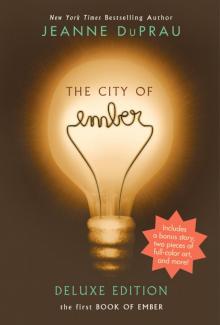 The City of Ember
The City of Ember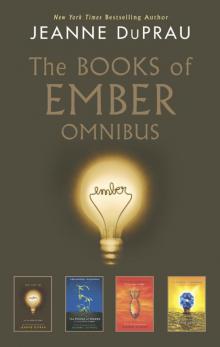 The Books of Ember Omnibus
The Books of Ember Omnibus The Diamond of Darkhold
The Diamond of Darkhold Voyagers: Escape the Vortex (Book 5)
Voyagers: Escape the Vortex (Book 5)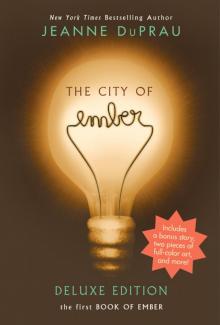 The City of Ember Deluxe Edition
The City of Ember Deluxe Edition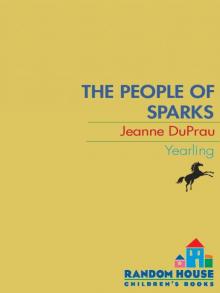 The People of Sparks: The Second Book of Ember (Books of Ember)
The People of Sparks: The Second Book of Ember (Books of Ember)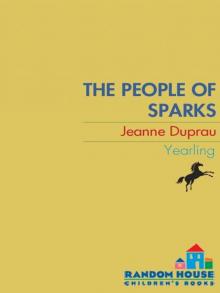 The People of Sparks
The People of Sparks Escape the Vortex
Escape the Vortex Car Trouble
Car Trouble The City of Ember: The First Book of Ember
The City of Ember: The First Book of Ember